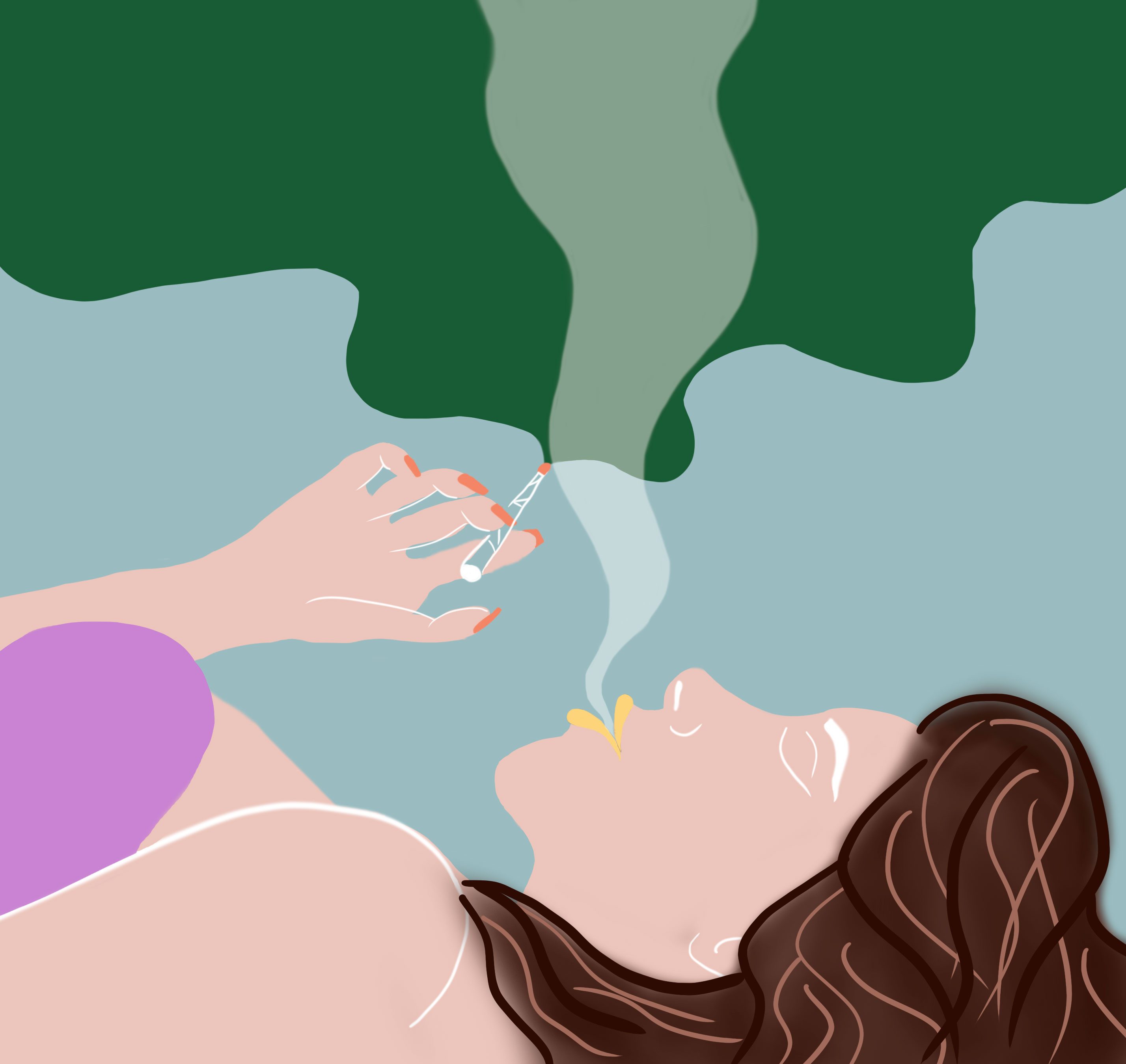

Welcome to THE HOT BOX, the Emerald‘s monthly column where TEDx talker, Ariel Sobel, gets heated about sex, cannabis—and basically anything else that would make your grandma spit up her Ensure Nutrition shake at the table! The winner of the Bluecat Screenplay Competition, Sobel is a grassroots activist against sexual and gender-based violence whose work been highlighted in KTLA, CBS, Yahoo, Univision, and Los Angeles Times.
![]()
We’re in an era where people openly debate if the world is flat. People question if they should vaccinate their babies. There’s even a conspiracy theory about if Avril Lavigne is alive. Yet one sure fact remains uncontested: sex sells.
Sexuality lines Kylie Jenner’s closets with Birkin bags. It floods Sports Illustrated with readers. Sex even gets us to order a burger as subpar as the one from Arby’s. We’ve seen sexual innuendo as the perfect marketing practice, even for products that are culturally taboo.
However, in the Campaign for Cannabis Legalization, Sex Appeal has been Largely Under-Utilized
In cinema, cannabis imagery is anti-erotic. Filmmakers use the stoner stereotype to express laziness, poor self-care, and selfishness.

Take into account the now-classic rom-com Knocked Up. Seth Rogen plays an overweight, deadbeat smoker. He characteristically returns to cannabis whenever he is failing to mature or be an attractive partner for the typical uptight Katherine Heigl.
Judd Apatow is not the only filmmaker who has depicted cannabis users as the epitome of un-sexiness. In 1980’s Caddyshack, stoner Carl Spackler (Bill Murray) is an unclean bucket hat-wearing, unhinged groundskeeper. Two years later, Jeff Spicoli (Sean Penn) solidifies the pothead surfer stereotype in Fast Times at Ridgemont High.
Let’s not forget the eternally squinting Ron Slater of 1993’s Dazed and Confused. The film itself dubs him a loser. His contemporaries aren’t much more suggestive. No one is getting hot for Harold and Kumar. Even Pineapple Express found a way to make James Franco look ugly.
 In contrast, filmmakers portray smokers as sensuous. Since the 1880s, scantily clad women have been used to sell tobacco (even if scantily clad meant wearing leggings). Tobacco companies plastered a model adorning stockings on the packages of cigarettes in the 19th century. In the 1930s, semi-nude drawings in cigarette advertisements inherited their sexualized tone.
In contrast, filmmakers portray smokers as sensuous. Since the 1880s, scantily clad women have been used to sell tobacco (even if scantily clad meant wearing leggings). Tobacco companies plastered a model adorning stockings on the packages of cigarettes in the 19th century. In the 1930s, semi-nude drawings in cigarette advertisements inherited their sexualized tone.
Hollywood cast Seth Rogen as a stoner before he started to get even remotely hot. Conversely, Marion Cottaird in Midnight in Paris or Kate Winslet in Titanic portrayed smoking seductresses.
According to a study from the University of Adelaide, when femme fatales smoke onscreen, it sexualizes the act in real life.
As a result, legalization advocates can learn from the tobacco industry. Decriminalizing cannabis is not just about teaching the public about its health benefits. It’s about selling cannabis in both a product and a perception sense.
 By Furthering the Stereotype of the Unsexy Stoner, Cannabis Culture Contributes to its Stigmatization
By Furthering the Stereotype of the Unsexy Stoner, Cannabis Culture Contributes to its Stigmatization
It’s time that we push to sexualize cannabis and those who use it. Don’t worry, we can still celebrate the comical, laid back characters we’ve grown to love.
Due to smoking’s obscene health risks, the government increasingly regulates the tobacco industry. Even movie maturity ratings go up due to characters smoking onscreen.
For the first time in history, the advertising gap is closing; cannabis now has the same marketing opportunities as cigarettes. Furthermore, cannabis is obviously the safer product. Unlike smoking, most forms of it do not cause lung or mouth cancer. Plus, it actually has proven health benefits. This is the opportune moment for the cannabis industry to shift its branding towards sex appeal.
 It’s not Like Cannabis Can’t be Depicted as Sexy—Rihanna has been Doing it for Years
It’s not Like Cannabis Can’t be Depicted as Sexy—Rihanna has been Doing it for Years
Before stoner comedies took over, cannabis had sexy characters. The most memorable is Brad Pitt’s portrayal of Floyd in Quentin Tarantino’s 1993 sensual crime film True Romance.
“Crashing on the couch and watching shitty movies on TV, Floyd is a hilariously out-of-it bum, nonchalantly offering angry, armed mobsters a hit from his handmade bong (made of a plastic honey bear) when they barge into his home,” Noel Murray and Tim Grierson wrote of the film in Rolling Stone. “But Floyd’s no peace-and-love hippie: Telling off James Gandolfini’s tough guy with a muttered ‘I’ll fucking kill you, man,’ Pitt gives the pothead a serrated edge.”
While Floyd is no steamy noir socialite, he’s still Brad Pitt (therefore, inescapably attractive.) It puts forward the idea that you can be handsome and partake in cannabis.
Now imagine if polished Scarlett Johanson or Emma Stone became the new onscreen stoners.
Really Want to Legalize Cannabis in our Civilization? Change its Status in our Culture
Scientists proved this in a 2007 study by Stanford Research into the Impact of Tobacco Advertising (SRITA). In it, sexualized advertisements manipulated women to believe smoking cigarettes would make them sexier.
Hence, in order to legalize cannabis, we must normalize it. That entails depicting its users as aspirational. Right now, the media does the absolute opposite.
Who would want to be overweight, underdressed, and unemployed? Not even Seth Rogen, anymore.



https://www.latimes.com/opinion/story/2020-02-11/cannabis-farms-california-agriculture-regulations
this is probably of interest to the emerald triangle.